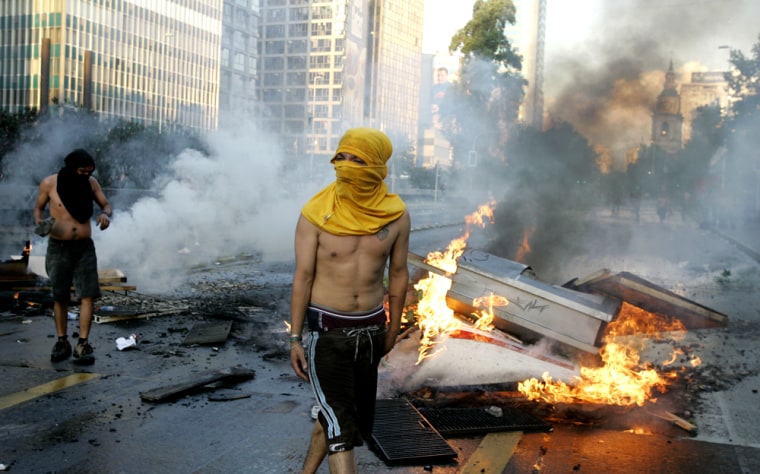The death of former Chilean dictator Augusto Pinochet Sunday brought tears to his dwindling number of supporters, while some of his opponents clashed with police after throwing rocks at cars and setting up fire barricades in the streets.
Police struggled to keep the two groups apart and used water cannons and tear gas to scatter activists outside the presidential palace.
The clashes broke out as hundreds of mostly young demonstrators marched to the presidential palace, and later spread to several working-class districts. Police said 23 officers, including a major and a captain, were injured. Authorities said there were a number of arrests.
Deputy Interior Minister Felipe Harboe blamed the violence on “minority elements who infiltrated the demonstration.” He appealed for people across the country to remain calm.
Many Chileans saw Pinochet’s death as reason for celebration. Hundreds of cheering, flag-waving people crowded a major plaza in the capital, drinking champagne and tossing confetti.
Jorge Alvarez told state television he was there “for my relatives, my friends who were jailed and exiled. I know it seems odd celebrating somebody’s death, but...”
A man who passed next to him sipping champagne from a bottle chanted “He’s gone, he’s gone, that’s good.”
‘Death seals Pinochet’s impunity’
Across the globe, human rights activists expressed frustration that the general managed to avoid trial for the thousands of deaths that occurred during his 17-year regime.
“Death seals Pinochet’s impunity,” said Venezuelan Vice President Jose Vicente Rangel, who had been a friend of Salvador Allende, the democratically elected Chilean president who died in the 1973 coup that brought Pinochet to power.
“Pinochet has died, and I don’t think he’s going to heaven,” British human rights lawyer Geoffrey Robertson told BBC television. “His death does rob us of a proper trial and retribution for his victims.”
Chile’s government says at least 3,197 people were killed for political reasons during his rule and thousands more disappeared, but after leaving the presidency in 1990 Pinochet escaped hundreds of criminal complaints because of his declining physical and mental health.
Chileans who believe Pinochet saved them from communism wept and hoisted posters with the general’s image. Some chanted that Pinochet and his feared secret police were Chile’s saviors.
“He will live forever in my memory — I love him as much as my own children,” said Margarita Sánchez outside the hospital where Pinochet died.
Another woman, Rosa Godoy, told state television Pinochet was “our liberator.”
“He saved us from communism,” she said. “This a very sad day for us.”
Pinochet, 91, had very few supporters left outside Chile, judging from the reaction from countries once allied with his dictatorship. But the office of former British Prime Minister Margaret Thatcher, who had been a close ally of Pinochet, said she was “greatly saddened” by his death.
President Bush’s administration reached out to Pinochet’s opponents Sunday, saying his regime “represented one of the most difficult periods in that nation’s history.”
“Our thoughts today are with the victims of his reign and their families,” said White House spokesman Tony Fratto.
While some former U.S. presidents quietly supported Pinochet, the current administration has good ties with Chile’s free-market Socialist President Michelle Bachelet, whose father — a Pinochet opponent — died after being tortured in prison.
Like the White House, British Foreign Secretary Margaret Beckett focused on Chile’s advances since Pinochet left power in 1990, paying tribute to “an open, stable and prosperous democracy.”
‘Disappearances’
Others focused on the long wait for justice by Pinochet’s victims.
Human Rights Watch said Pinochet pioneered the use of “disappearances” as a tool of repression and watched his reputation erode as prosecutors pursued complaints of human rights abuses.
“Pinochet spent his last years fending off an ever-tightening web of prosecutions in Chile and died a profoundly discredited figure in the land he once ruled,” said Jose Miguel Vivanco, Americas director at Human Rights Watch.
Emilio Alvarez Icaza, head of Mexico City’s Human Rights Committee, called Pinochet “one of the clearest expressions of brutality in the flesh.”
The former dictator’s death “left me with a bittersweet taste because they didn’t manage to prosecute him in his life for all the crimes he committed,” Alvarez Icaza said.
Susana Perez Gallard, co-president of the Permanent Human Rights Assembly in neighboring Argentina, said, “We have had a long wait for this man to be convicted for his crimes against humanity, but lamentably he passed away without it happening.”
The London-based human rights group Amnesty International said Pinochet’s death “should be a wake-up call for the authorities in Chile and governments everywhere, reminding them of the importance of speedy justice for human rights crimes, something Pinochet himself has now escaped.”
